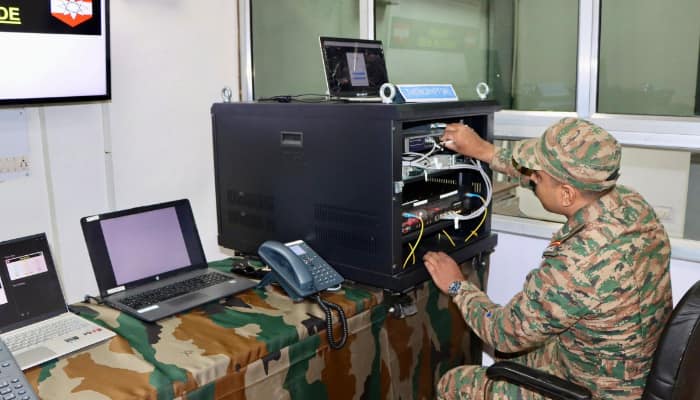New Delhi: With an intention to facilitate better collaboration at the regional level, the Indian Army has established several Regional Technology Nodes (RTNs) across the country, a transformative initiative that aligns with the country’s vision for self-reliance in defence production.The RTN Pune covers Maharashtra, Gujarat, and Goa region, whereas the one established in Bengaluru covers Karnataka, Telangana, Tamil Nadu, and Kerala.The initiative aims to create collaboration among industries, academia, and research institutions.
These nodes ensure that cutting-edge technologies are developed indigenously while strengthening India's defence capabilities on a global scale.RTNs are specialised hubs established by the Indian Army to enhance collaboration between the military, industry, academia, and research institutions, foster innovation, promote Indigenous defence production, and ultimately give a boost to the “Make in India” initiative.The Army Design Bureau (ADB), which aims to modernise defence capabilities and reduce reliance on imports, is behind the establishment of the RTNs.

A core element of the Army's strategic vision involves cultivating the capabilities of the domestic defence sector, achieved by providing hands-on guidance and ensuring alignment with the evolving dynamics and, in turn, the demands of modern warfare.These nodes facilitate the development of defence solutions by engaging startups, MSMEs, and large industries, which are required to cater to Indian needs.They act as platforms for interaction between the Army and stakeholders such as defence manufacturers, R&D institutions, and academia.
With the RTNs in place, the Army is identifying and nurturing technologies that address its operational and logistical needs.These RTNs will help provide recommendations for integrating cutting-edge innovations into military operations.The Indian Army launched the first such node in Pune in November 2021 under the Southern Command.
Since Pune is home to several established companies and start-ups that make various kinds of defence equipment, the industrial ecosystem supports defence R&D and manufacturing. This further helps in engaging the promotion of niche technologies such as surveillance drones, personal mobility devices, and fuel additives.Similarly, the Bengaluru Regional Technology Node, which came into being in 2022, leverages Bengaluru’s aerospace manufacturing expertise, which includes drone-related start-ups.
A year after the node came up, a discussion among the Army, industry, and academia was held for the exchange of ideas to understand the potential of industry and academia.As the Army already has its requirements in place in alignment with the current trends of the battlefield, depending on the nature of warfare, the RTNs help in the identification of technologies required in future development. For instance, at the time of launching the Bengaluru node, the Army had more than 20 products in mind worth hundreds of crores of rupees.
The Army conducts workshops and forums for the industries through these nodes. In a way of technological scanning, they identify emerging technologies with potential applications for military use.RTNs further go hand-in-hand with the Army’s efforts to collaborate with academic institutions, aimed at harnessing the best talent in some of India’s premier institutes, such as the Indian Institutes of Technologies (IITs).
In terms of growth for Indian Research & Development efforts, the RTNs connect innovators with research institutions like DRDO labs to accelerate development cycles.Moreover, these nodes are poised to address specific operational challenges by taking Army problem statements to industry stakeholders for solutions.They also reduce dependency on foreign suppliers by enabling partnerships with Indian startups and MSMEs, promoting local manufacturing of advanced technologies like drones, robotics, AI systems, and weaponry.
Integrating indigenously developed technologies successfully boosts India's reputation as a global defence supplier.One of the key features of this initiative is granting startups access to military testing ranges and equipment, enabling them to validate their technologies in real-world conditions. This policy shift eliminates the need for private players to rely on foreign facilities, reducing costs and accelerating development cycles.
RTNs, facilitating growth, are also key to boosting India’s defence exports, which are already on an upward trajectory..
Top

Army's regional technology nodes fostering self-reliance in defence production

The Indian Army has launched Regional Technology Nodes (RTNs) across India to boost regional collaboration in defence innovation. These nodes aim to integrate industry, academia, and research to develop indigenous technologies.











